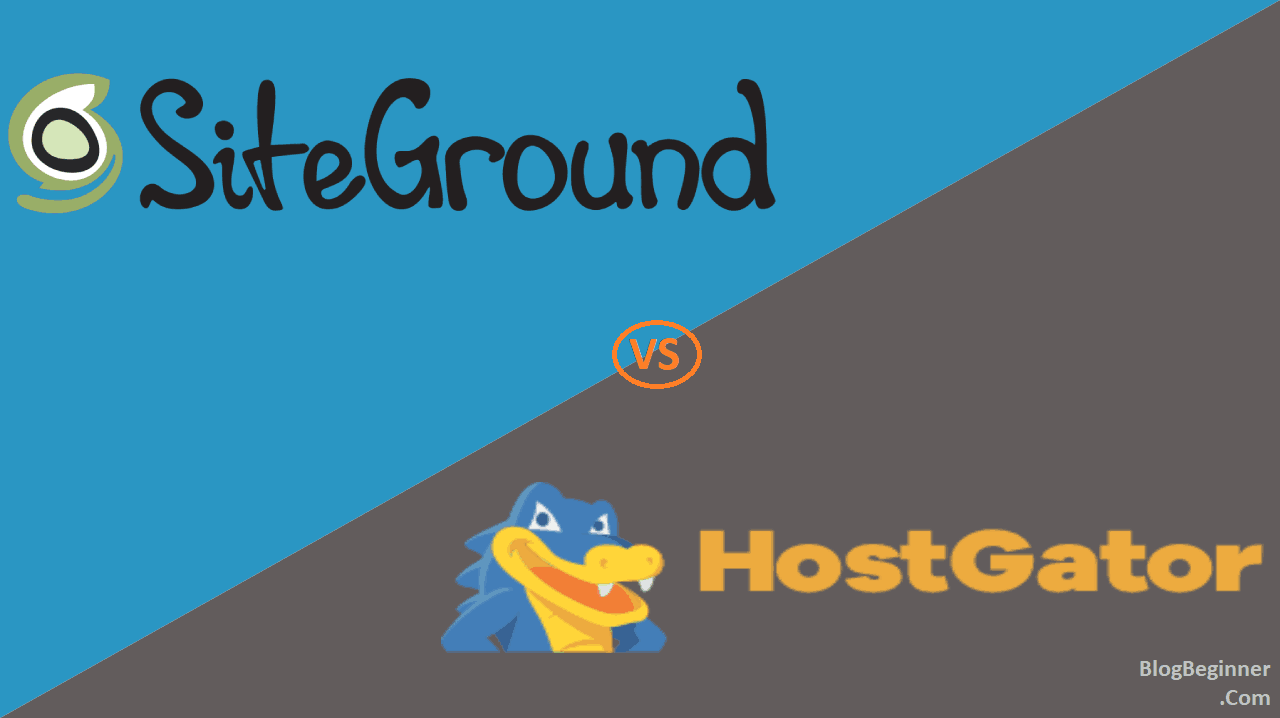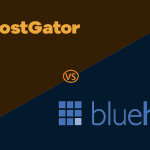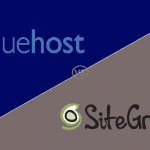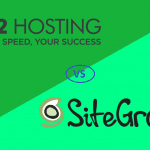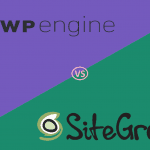A web host is in the simplest terms described as the home for your website.
It’s the virtual space that your website resides in – and with companies working painstakingly to establish their trades on the online space.
It becomes very confusing for anyone with limited knowledge of web hosting companies to pick the best web hosts.
If you’re unable to pick a web host or have been disappointed in the past, you’ve come to the right place.
We understand that you’re looking for only the best services which is why we’re doing a comparison of two of the highly-regarded and popular web hosting service providers.
Understandably, choosing a poor and an unreliable web hosting company is more like building your home on quicksand or stabbing yourself on the back, and paying the full price for the service.
This article will help you establish the difference between these two web hosts, then determine which of the two works best for you.
It’s also important to mention the fact that our analysis is based on the elemental features that make a reliable web hosting company.
These features include the web host’s performance, uptime, speed, pricing/ plans, support, user-friendliness, as well as server locations.
So, let’s get started.
Contents In Page
Introduction
SiteGround Introduction
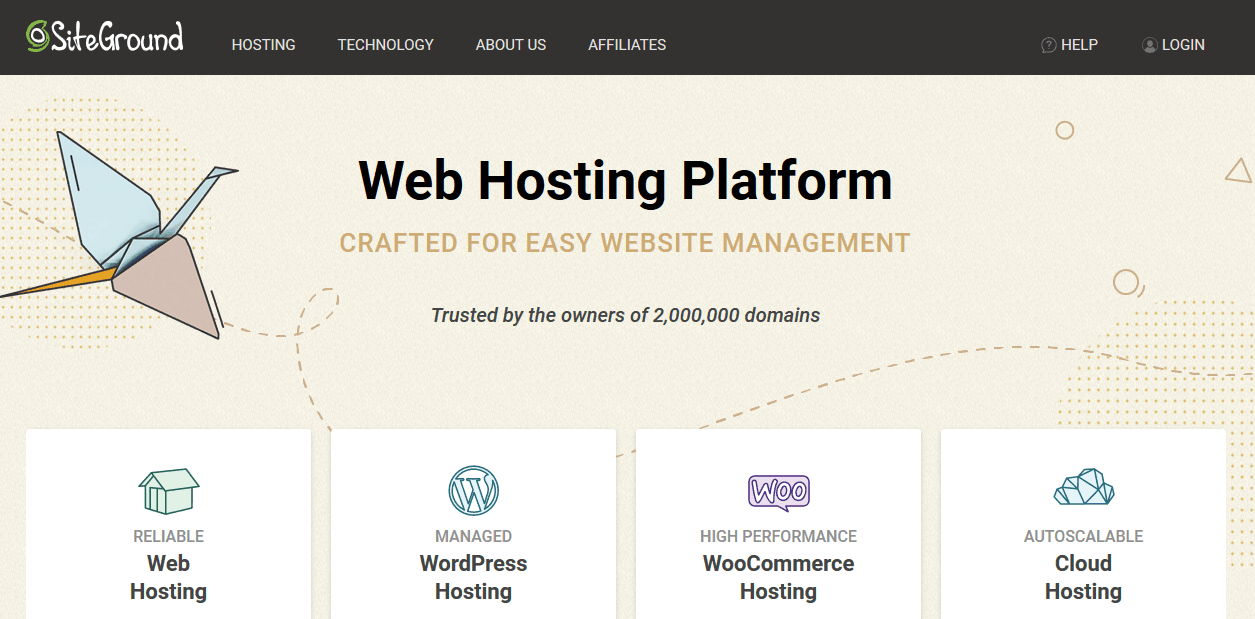
Established in 2004, SiteGround is a web hosting service provider, and it’s one of the biggest independently-owned web hosting companies boasting at least 400 employees.
This company boasts a huge capacity of processing a minimum of 1,500 tickets, at least 3000 chat requests, and over 1000 phone calls, every day. On their main trade, this web host hosts over 2 million domains with new subscriptions recorded by the hour.
Reading about these two companies could easily sway you in one direction, and it might not be the best option. But by looking at the features expected from a top web hosting company, we can guide your decision.
Hurry! Get 70% OFF On SiteGround Now
HostGator Introduction
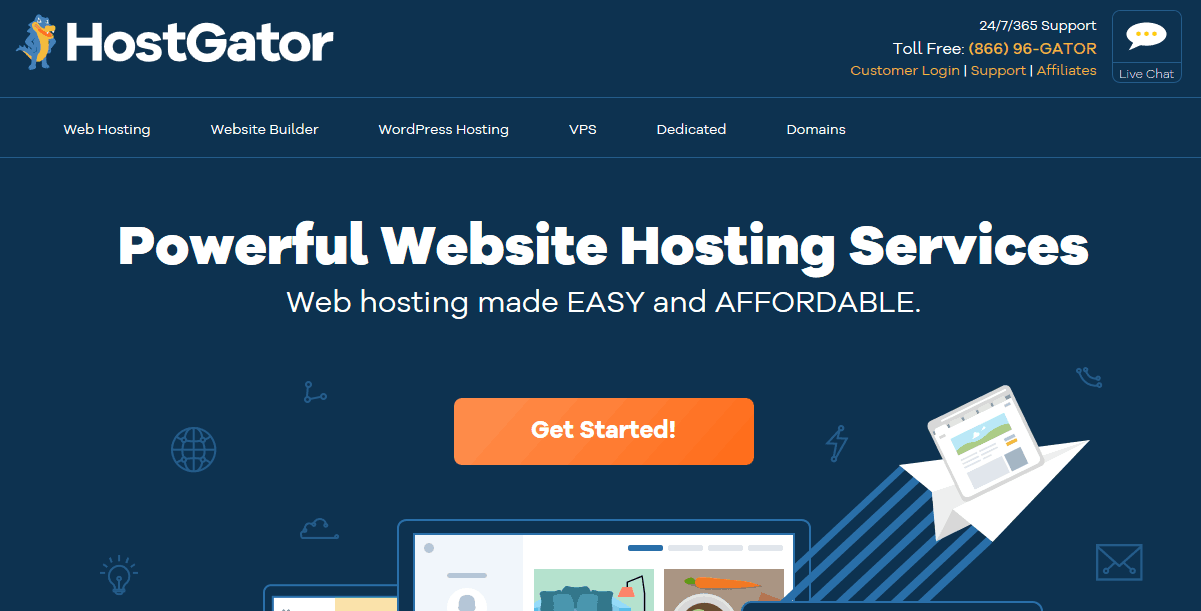
HostGator is a Florida-based worldwide provider of web hosting services. Since the company’s inception in 2002, it’s been on a steady incline with hundreds of employees (over 850) and eight million domains in their service.
It’s also an award-winning company and is regarded as one of the world’s top-10 biggest and best web hosting service provider. HostGator is owned by the renowned EIG group.
What you might not know is that EIG is also a big international brand of web hosting and it owns approximately 40 of the leading web hosting companies like HostGator, iPage, and BlueHost.
Hurry! Get 80% OFF On HostGator Now
Why not EIG’s HostGator?
Naturally, we’d expect a company owned by a world leader in web hosting to be a top performer, but that isn’t the case always. As you might already know, there is more than a name which is why HostGator isn’t the obvious pick here.
Despite starting at the top and being a highly recommended brand, the quality of their services – the performance and the quality of services have been declining over the years.
Since 2013, there have been multiple complaints about the web host’s speed, uptime, and even the quality of their support services.
The interesting bit is that HostGator’s clients claim that the quality of the services offered by the company started declining after EIG took over the company’s ownership.
On the flipside, you have SiteGround, a web hosting company whose recorded significant growth from 500,000 in 2016 to 1.8 million in 2018 translating to a 300% growth in two years.
Complete Overview of Both Companies
| SiteGround | HostGator | ||
|---|---|---|---|
| 1. | Starting Price | $3.95 per month | $2.75 per month |
| 2. | Service Offered | Web Hosting & Domain Registration | Web Hosting & Domain Registration |
| 3. | Payment Methods | All types of credit cards. Contact SiteGround for Paypal Payment. | All types of credit & debit cards. PayPal, bank wires, checks & money orders. |
| 4. | Coupons | 20+ SiteGround Coupons | 20+ HostGator Coupons |
| 5. | Uptime Guarantee | 99.99% | 99.99% |
| 6. | Value For Money | Yes | Yes |
| 7. | Support | Very Good. | Very Good. |
| 8. | Monthly Payment option | Yes. But not in all plans. | Yes. |
| 9. | Money Back Guarantee | 30 Days. | 45 Days. |
| 10. | Free Domain | No. Siteground not offer free domain. | Yes. But not every time. |
| 11. | Free Migration Service | Yes | Yes |
| 12. | Free SSL | Yes | Yes |
| 13. | Account Panel | SiteGround offer cPanel | HostGator offer cPanel |
| 14. | Free Backups | Yes | Yes |
| 15. | SSD Storage | Yes | Yes |
| 16. | Free CDN | Yes. By Cloudflare. | Yes. |
| 17. | One-Click Installers | Yes. SiteGround provide it in cPanel. | Yes. HostGator provide it in cPanel. |
| 18. | Popularity | SiteGround very popular. | HostGator also very popular. |
| 19. | Security | Very Good | Very Good |
| 20. | Easy to use | Yes | Yes |
| 21. | Trusted Hosting Provider? | Yes | Yes |
| 22. | Do we recommend | Yes. Highly Recommend. | Yes. Highly Recommend. |
| 23. | Review | Check SiteGround Review | Check HostGator Review |
Top 10 Hostings to Check Before Select Any One
➩ Top 10 Best Web Hosting
➩ Top 10 Best WordPress Hosting
➩ Top 10 Best Cloud Hosting
➩ Top 10 Best Website Builders
➩ Top 10 Best Dedicated Server Hosting
➩ Top 10 Best VPS Hosting
1. Uptime
The uptime offered by a web host is closely related to their performance since it determines how long your website will be online or how much downtime to expect.
You shouldn’t, however, go with the advertised uptime rate mentioned by the company because no company in this year will quote an uptime of less than 99.9% percent – it’s what you’re looking for, and that’s what they’ll promise.
So, first, check out reviews by past users to have an accurate picture of what you’re getting.
Still confused?
Well, uptime represents the total time that the company’s servers your website is hosted on will be up and operating effectively.
SiteGround
Looking at these two companies, SiteGround guarantees 99.99% uptime across all its plans, while also noting that they use a custom programming feature that works like a detection system to sniff out any potential downtime problems, correcting the problems before they happen.
HostGator
HostGator also promises 99.99% uptime, which is guaranteed whether you opt for their shared plan or if you use their complicated dedicated server hosting service.
Check our all web hosting deals & Reviews.
2. Performance
History, ownership, and reviews aside, what is the web hosting performance of these two companies like?
The biggest reason for SiteGround’s 300% growth in only two years is attributed to the company’s use of edgy technologies.
This host employs SSD servers; they have their unique and inbuilt caching systems like HTTPS Speeding and SuperCacher, as well as the latest software releases.
The use of SSD servers is the leading contributor to the company’s success thanks to the fact that the SSD/ Solid State Disks rely on electronics without moving parts, enhancing the reliability and the speed of the servers, unlike the HDDs (Hard Disk Drives) which rely on electronics with moving parts.
While HDDs are more like floppy disks manufactured with terabytes support for data storage, the SSDs lack the rotating parts’ design, and they’re more like the NAND-Flash memory which is similar to what’s used in the thumb drives and the RAM chips.
The SSDs store digital data by use of integrated circuits that ensure storage in binary form rather than in electronic recording technology.
As a result of the design, the SSDs can transfer up to 95% more data than HDDs under strain. The SSDs are also 20X faster in the processing of I/O requests.
Here is a summary of the benefits of SSDs
- SSDs come with faster hosting speeds
- They offer better security for data
- The SSDs execute requests faster
- They work well with database-intensive uses such as forums or e-commerce sites
- It offers reliable performance since there is no disk fragmentation
- It has a low power usage making it an eco-friendly
SiteGround
While SiteGround has multiple other features, their use of SSDs rather than HDDs is one of the biggest drivers for their good performance.
The other unit that determines the performance of a web host is whether they issue SSL certificates or not. While SiteGround and HostGator offer SSL certificates to ensure encrypted connections, SiteGround beat HostGator in providing the service making SiteGround a preferred choice for most people.
HostGator
Lastly on performance is SiteGround’s use of HTTPS Speeding features like TLS 1.3 or OCSP Stapling, features absent in HostGator.
The speeding function is important because HTTPS naturally adds additional load time to websites. By introducing speeding features, you don’t have to worry about delays because of HTTPS.
Even with its pitfalls, HostGator is capable of maintaining high-quality web hosting services to small and large companies without much of a structural issue.
Unfortunately, HostGator doesn’t offer modern features and functionalities that enhance web hosting for clients.
3. Speed
Speed is the other critical component to be evaluated in your search for the superior web host of the two. Overall, both web hosts promise high website speeds but looking at the factors and features that affect speed; you will notice some big differences.
An important feature when it comes to the speed of the web host is the TTFB (Time to First Byte).
TTFB is also called “waiting” time by Google, and it refers to the amount of time/ milliseconds that it takes for the browser to receive the first byte of the search response from your website’s server.
You could think of it as the wait time before one receives the first response from the servers. TTFB captures all the latency of transmission to the server and the time you wait on the server for a response.
You want to work with a web host with the minimum possible wait time to prevent your site’s visitors from abandoning your site and for your website’s top-ranking on Google.
So, the next time your consultant throws in words like bounce rates and slow loading speeds, know that they’re talking about TTFB.
To be on Google’s good books, make sure that your website’s TTFB is less than 200 milliseconds.
Now back to SiteGround and HostGator, which is faster?
SiteGround
SiteGround appears to have the higher ground here with clients expressing their satisfaction with the company’s speeds.
The reason for this is that SiteGround’s high speed is based on their use of high-quality and unique open-source projects which are responsive to good caching systems. The web host leverages this function using its customized and built-in SuperCacher which speeds things up.
SiteGround’s high speed also comes from their investment in VPDS servers that use the Supermicro Server Chassis, the SuperCacher, Dual AMD Opteron CPUs, as well as RAID 10 Disk Arrays.
The SuperCacher plugin is one of the features that ensure high speeds and low TTFB. The plugin features three levels of caching which store the static resources/ web pages ensuring that the server only sends a small amount of data.
Caching will, therefore, ensure fast-loading of your site, even if your website has complex and heavy design elements.
HostGator
Unfortunately, this isn’t the case with HostGator which uses multiple server layers and more equipment in an attempt to speed up its service delivery.
CloudFlare CDN
Besides the caching system, SiteGround uses CloudFlare CDN which boosts the web host’s speeds further.
A CDN or a Content Delivery Networks is the geographical distribution of the group of servers that work together to ensure the fast and efficient delivery of searched content on a web browser.
A CDN will also allow the fast transfer of the assets that are needed to ensure the loading of JavaScript files, HTML pages, images, videos, and stylesheets among others.
Overall, CDNs will effectively improve your website’s loading times through the distribution of content to the serves closest to the web visitors.
What this means is that the globally distributed servers prevent your users from connecting to your website’s primary (original) server every time.
CDN allows your users to easily connect to the data center closest to them – hence a reduction of travel time and fast service. But that is not all; a CDN could also reduce the volume of data transferred because it could employ tactics like file compression and minification to reduce file sizes.
Naturally, a small file takes little load time. Additionally, CDNs optimize the connection reuse while enabling TLS a false start in sites that use SSL and TLS certificates.
Therefore, you can expect a reduction in your website’s bounce rates and long stay times.
Note that when a CDN is configured well, it could also protect your website from malicious attacks like DDoS attacks.
The other feature that enhances the performance and speed of SiteGround is RAID 10 Disk Arrays. It offers a high level of redundancy, as well as performance.
With HostGator missing all these features, it’s clear that SiteGround offers higher speeds.
4. Data Center Locations
HostGator
HostGator has its primary servers located in Provo, Utah, Australia, and in Houston, Texas, as well as 23 other server locations across the world.
The company has a partnership with SoftLayer, a collocation provider with data centers across the world.
SoftLayer also boasts some of the best data centers in the world, all equipped with several power feeds, power generator, as well as constant server monitoring. They also have some of the best UPS backups around.
SiteGround
SiteGround, on the other hand, has its data centers in four locations – Chicago, Amsterdam, London, and Singapore. These data centers are also equipped with premium-quality hardware.
Additionally, the data centers’ locations were selected strategically for the web host to provide its clients’ with the fastest data processing, based on their locations.
These features are topped off by the free CDN services offers to all its clients from all the 23 server locations worldwide.
Generally, a web host with multiple server locations offers high-speed and high-performance services. And SiteGround is, without a doubt better than HostGator thanks to the superiority of their infrastructure.
5. The Servers’ Response Time
Essentially, a web server is a large hard drive with based at a secure off-site facility. The hard drive’s speed will, therefore, affect the speed of your website.
Often, the speed of the server is influenced by the server load, and you want to work with a web host whose servers have a low load. Overloaded servers do not have room for seasonal increases and surges.
Both HostGator and SiteGround have an impressive profile when it comes to the servers’ response times. HostGator’s servers work to enhance balance and stability for a healthy response time.
On the flipside, SiteGround’s servers will not only allow for surges in the server loads but will also work to keep the server loads low, on purpose. This purposeful act makes it possible for the web host to increase the server load when the need arises.
Even so, SiteGround has a better response time than HostGator since it has more features that boost the server loading times.
6. Security Protocols
Before you pick either SiteGround or HostGator, or any other web host you could be thinking about, first confirm their security systems.
Does the web host offer security against malware?
Do they have reliable backup protocols?
Will the web host scan your site for malware regularly?
To answer these questions, here is a look at these two web hosts.
HostGator
HostGator employs multiple high-end security features to protect hosted websites.
The security features include their secure offices and data centers fitted with fire suppressors, diesel generators, high-end cooling systems, smoke detectors, and uninterrupted power.
The entrances for the building have biometric locks, CCTV monitoring, and security guards who patrol the centers around the clock.
On top of physical security measures, the web host also offers malware scanning and data backups weekly.
Unfortunately, a week is too long for you to go without backing up your data which is why we recommend running scans and backing up data on your end frequently to prevent loses.
HostGator also offers a feature called SiteLock which secures your website.
SiteGround
One of the selling features by SiteGround is their free daily backup.
In a volatile digital space, access to daily rather than weekly data backups will make the difference between losing customers/ your reputation and having happy, well-paying clients.
Besides daily backups, SiteGround is known for using isolated and encrypted servers. With this setup, your site will not be affected if someone else’s site is compromised.
The hosted sites are also protected from hackers thanks to its unique setup which guides you to SiteGround’s encrypted server every time you’re logged into the cPanel.
The SG Site Scanner Tool adds a layer of protection by scanning your site for malware and viruses. This tool is powered by SiteGround in collaboration with Sucuri cybersecurity firm.
Also on security is the host’s software security systems. The web host uses the latest versions of the software. They also write their unique patches to fix software problems instead of waiting on the software providers.
Lastly, the hosting company has secure physical infrastructures, as well as hardware redundancies which further keep your website secure.
Like other hosting companies, this host has physical security systems like bulletproof lobbies and uninterrupted power supplies, as well as multiple redundancies in their software, hardware, as their skilled personnel.
The company also keeps replacement parts for all the server models in use. They are also prepared for server malfunctions with server replacements ready.
These replacements are installed with the relevant software and hardware needed and also plugged in which means that it will take them minutes to transfer data to the new server and restore services. With the daily backups, you hardly lose anything.
If you’re to choose one over the other, the obvious pick is SiteGround.
SSL Certificates
The Socket Security Layer or SSL certificates are important website security features which ensure that your data is highly encrypted and secure in its transmission across the internet.
SiteGround gives its clients’ access to three types of SSL certificates – WildCard, Let’s Encrypt Certificates, and EV SSL. Of the three, WildCard is the only free SSL certificate, but it offers a high level of protection.
Like SiteGround, HostGator also offers SSL certificates available to all their plans save for the basic Hatchling plan.
Their SSL certificates include Domain Validated Certificates, Extended Validation Certificates, Company Validated Certificates, Multi-Domain, and WildCard Certificates.
In terms of variety, HostGator wins, but when considering the accessibility with regards to the plans you select, SiteGround is a preferable option.
7. MoneyBack Guarantee
SiteGround offers a not-so-impressive 30-day money back guarantee only applies to the different hosting plans. There are no rebates offered on the domain name or any other add on.
On the other hand, HostGator offers a 45-day money back guarantee, but only to clients with new contracts. This guarantee isn’t inclusive of the admin fees, add-ons, or the cost of the domain name.
-
Upgrades
Both companies offer easy upgrade processes, and you only pay the extra amount charged for the plan you’ve upgraded to.
8. Support
With overstaffed shifts, SiteGround provides reliable and efficient customer support services via phone, email and live chat.
These services are personalized, and you’ll see the person you speak with. You could also learn and resolve problems using their tutorials and guides.
HostGator offers equally good customer support services available 24/7/365 via email, live chats, and phone calls.
They also have at least 500 tutorials and a minimum of 700 articles for you to learn from.
9. Additional features
SiteGround
SiteGround will give you a domain name that’s free for the first 12 months after signing up for their hosting services, they accept migrations at no cost (but to a maximum of 1GB), and you also get a free website builder.
It does not, however, provide advertising credits.
HostGator
HostGator will also give you a free domain name for the initial duration of your contract, free website migration, and $100 in advertising credits for Google AdWords, topped with $100 more credits for Bing or Yahoo advertising.
The host also has a website builder, but it’s accessible at a small cost.
Who is Winner?
⪼ Hurry! Get 70% OFF on SiteGround Now
⪼ Hurry! Get 80% OFF on HostGator Now
| Category | Winner |
|---|---|
| Uptime | SiteGround |
| Performance | SiteGround |
| Speed | SiteGround |
| Data Center Locations | HostGator |
| The Servers’ Response Time | SiteGround |
| Security Protocols | SiteGround |
| SSL Certificates | SiteGround |
| Upgrades | Both |
| MoneyBack Guarantee | HostGator |
| Additional features | SiteGround |
| Support | SiteGround |
| 🏆 Final Winner | SiteGround |
Reviews By Users & Experts Of Both Companies
➩ SiteGround Review
➩ HostGator Review
Top 5 Competitors Reviews
➩ BlueHost Review
➩ A2 Hosting Review
➩ CloudWays Review
➩ Greengeeeks Review
➩ Dreamhost Review
Conclusion
While these two web hosting companies offer good hosting services, the features and functions offered by SiteGround make it a better web host than HostGator.
Note that both hosts offer shared, dedicated, VPS/ cloud hosting.
